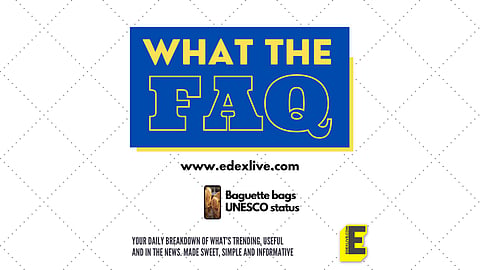

Ever thought that a unique kind of loaf will be conferred with world heritage status by UNESCO (United Nations Educational, Scientific and Cultural Organization), an agency of the United Nations (UN)? Well, French bakers are in a joyful mood as their culture of baking baguettes has now become a part of UNESCO's intangible cultural heritage. A statement released by UNESCO read, "Baguettes require specific knowledge and techniques...They also generate modes of consumption and social practices that differentiate them from other types of bread." Further, "Their crisp crust and chewy texture result in a specific sensory experience," it added, as stated in a report by The Telegraph.
It was in the 1920s that the baguette, which means a wand or a baton, gained popularity. However, its roots can be traced back to the 17th century. As per the National Federation of French Bakeries, more than six billion baguettes are baked every year. Whether it is a croissant or any different type of bread, now French breads are available in many countries. With french bakeries opening up and introducing french dishes to the world, the audience has been quite interested to add these to their diet. So what do we know about this french item and why is this important? Here are all the details with #WhatTheFAQ.
Why was the baguette given this status?
Over the years, the culture of making baguettes has been dwindling. In this regard, France's culture ministry warned of a "continuous decline" in the number of traditional French bakeries that make these breads. Following this concern, the status has been given to recognise the artisan's craft in making the baguette.
UNESCO Chief Audrey Azoulay said the decision was a recognition of more than just bread; it recognised the "savoir-faire of artisanal bakers'' and "a daily ritual", as stated in a report by The Telegraph.
What is a French Baguette anyway?
A baguette is a thin bread distinguished by its length and crisp crust. It has its origin in French bread which is made from basic lean dough. Having a diameter of about five to six centimetres, its length is usually 65 cm and it can be made up to one meter long.
What is its importance?
It is not just bread or a loaf, it represents many bakers whose source of livelihood is based on making and selling this different bread. Parisian baker Priscilla Hayertz acknowledged to AFP that it was "a basic product" but one "that affects all socio-cultural categories, whether you're rich, poor... it doesn't matter, everyone eats baguettes".
What is the government saying?
Following this new status given to baguettes, the French government has laid out plans for the betterment of bakery houses. In this regard, the French government said it plans to initiate a Bakehouse Open Day to “enhance the prestige of the artisanal know-how required for the production of baguettes” and support new scholarships and training programmes for bakers, as stated in a report by The New York Times.
A threat in line?
Starting from the 1970s, the baguette has been under threat as the country has been losing 400 artisanal bakeries a year, reports state. This impact is most significant in France’s rural areas, where supermarkets and chains have overtaken traditional mom-and-pop bakeries. Moreover, making this threat worse are the sales of hamburgers since 2017, which have exceeded those of jambon-beurre, sandwiches made with ham in a buttered baguette.
Who else got this status from UNESCO?
As per UNESCO's tweets on November 30, here's the list of who got the #LivingHeritage status and for what.
Cuba: Knowledge of the light rum masters
North Korea: Pyongyang Raengmyon custom
South Korea: Talchum, mask dance drama
Japan: Furyu-odori, ritual dances imbued with people’s hopes and prayers
Egypt: Festivals related to the Journey of the Holy family
Germany: The practice of Modern Dance
Greece: August 15th (Dekapentavgoustos) festivities in two Highland Communities of Northern Greece, namely, Tranos Choros (Grand Dance) in Vlasti and Syrrako Festival
Guatemala: Holy Week in Guatemala
Hungary: Hungarian string band tradition
Saudi Arabia: Knowledge and practices related to cultivating Khawlani coffee beans
Saudi Arabia, Oman & UAE: Alheda'a, oral traditions of calling camel flocks
Spain: Manual bell ringing
Iran & Syrian Arab Republic: Crafting and playing the Oud
Jordan: Al-Mansaf, a festive banquet and its social and cultural meanings
Iran (Islamic Republic of Afghanistan): Yaldā/Chella
Oman: Al-Khanjar, craft skills and social practices
Cambodia: Kun Lbokator, traditional martial arts
